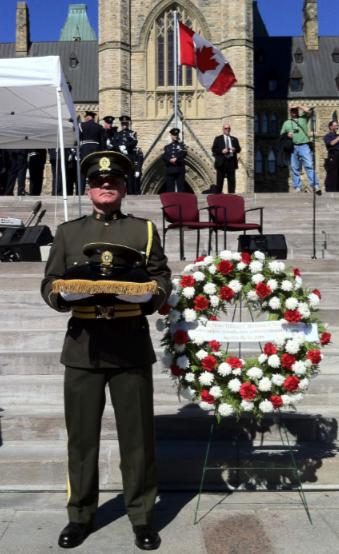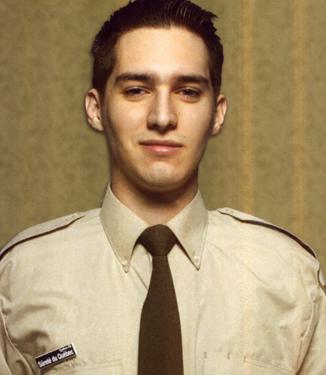
Sergeant Martin Benoit of the SDQ, holding a police cap that belonged to Coghlan-Goyette. Credit: Dale Smith
The partner of a Sûreté du Québec (SDQ) police officer killed in the line of duty has been honoured at a Parliament Hill ceremony, in what the Canadian Police Association says is the first time they have commemorated a same-sex partner.
Francis Blais was honoured as part of the Canadian Police and Peace Officers Memorial ceremony on Sept 25, at which his deceased partner, Constable Sébastien Coghlan-Goyette, was also celebrated.
The annual ceremony commemorates police officers killed in the line of duty.
Coghlan-Goyette was killed on Nov 14, 2010, when the patrol car he was driving hit a deer on Route 340 and subsequently crashed into a tree. A student who was riding with him was also killed in the accident.
“With his sudden death, any governmental organization recognized me as his partner, and I didn’t have any problem,” Blais says. “That’s good – we’re on the right path.”
However, Blais, 26, says it took some time to be recognized because the couple was not married.
“The organizations had some difficulty with recognizing young surviving partners,” he says. “It doesn’t happen often to see this situation, so it’s a longer process, but they finally recognized me as his domestic partner.”
Despite official police recognition, Coghlan-Goyette’s family, who have taken full control of the estate, did not acknowledge the couple’s agreement on their shared property and have claimed ownership of the condo the couple shared.
The mortgage was registered in Coghlan-Goyette’s name, and although the couple was in the process of putting Blais on official documents, Coghlan-Goyette did not leave behind a will, so his family inherited the property. They have refused to acknowledge the couple’s verbal agreement about property division and forced Blais to vacate the premises.
Blais, a paramedic, followed Coghlan-Goyette from Montreal to postings in Candiac, along Montreal’s south shore, and later to Les Cèdres, where they bought the condo.
“When I saw him the first time, I thought he was very nice and beautiful. I wanted to have a guy like him in my life,” Blais recounts. “Two weeks later, we met each other again to go out to Sky Club in Montreal, and this was the first time I kissed him. After, we went back to my place, and were together since then – six years. That’s the story.”
Blais says the early years were tough, when Coghlan-Goyette’s applications were refused by the Montreal police and several other services before he managed to get a job with the SDQ. Blais was working full-time to support the couple and simultaneously studying full-time to become a paramedic.
“It was very hard for me, but I did my best to support him. But the relationship got difficult because it all revolved around his work at that time,” Blais says. “We got through it together and became a mature couple – a lucky, mature couple for our age, because we were young and professional and had a good life together. We talked about having children together.”
Blais credits his family, friends and Coghlan-Goyette’s colleagues for their support in the months after the accident, as well as group therapy offered to surviving partners. He says he’s doing better now that he’s back to work and in a regular routine.
“It’s still very difficult for me because I’m in love with Sébastien always, and he’s still, for the rest of my life, my husband, and someone who I loved unconditionally,” Blais says. “But I’m better now.”


 Why you can trust Xtra
Why you can trust Xtra


